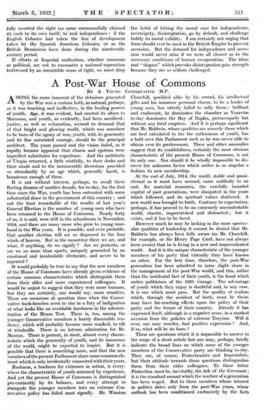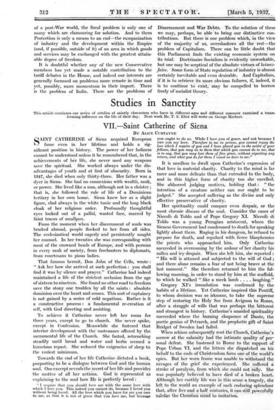A Post-War House of Commons
BY A YOUNG CONSERVATIVE M.P.
AMONG the more innocent of the delusions generated by the War was a curious faith, as natural, perhaps, as it was touching and ineffective, in the healing powers of youth: Age, it was evident, had erected its altars to Mammon, and youth, as evidently, had been sacrificed ; justice, as well as exhaustion, seemed to demand- that of that bright and glowing world, which was somehow to be born of the agony of war, youth, with its generosity and its fine untainted courage, should be the principal architect. The years passed and the vision faded, as it rapidly became apparent that charm and egotism were imperfect substitutes for experience. And the architects of Utopia returned, a little wistfully, to their desks and their stools and to the innumerable diversions provided so abundantly by an age which, generally harsh, is bounteous enough of these.
It is not without interest, perhaps, to recall these fleeting dreams of another decade, for to-day, for the first time since the War, youth has been entrusted with some substantial share in the government of this country ; and not the least remarkable of the results of last year's General Election is the number of young men who have been returned to the House of Commons. Nearly forty of us, it is said, were still in the schoolroom in November, 1918, and there are many more who grew to young man- hood in the War years. It is possible, and even probable, 'that another election will see us dispersed to the four winds of heaven. But in the meantime there we are, and what, if anything, do we signify ? Are we portents, or are we no more than sports, uniquely generated by an emotional and incalculable electorate, and never to be repeated ?
It would probably be true to say that the new members of the House of Commons have already given evidence of Certain common characteristics which distinguish them from their older and more experienced colleagues. It Would be 'unjust to suggest that they were more humane, but they are certainly, one would say, more sensitive. There are -occasions at question time when the Conser- vative back-benches seem to rise in a fury of indignation at what looks like an avoidable harshness in the adminis- tration of the Means Test. There is, too, among the younger Conservative members a barely discernible ten- dency; which will probably become more marked, to tilt at windmills. There is an intense admiration for Mr. IVIaxton. There is present, in short, almost every charac- teristic which the generosity of youth, and its innocence Of the world, might be expected to inspire. But it is possible that there is something more, and that the new members of the present Parliament share some common de- ment which is only incidentally connected with their years.
Rashness, a fondness for extremes in action, is every- where the characteristic of youth untamed by experience. And yet the present House of Commons is distinguished pre-eminently by its balance, and every attempt to stampede the younger members into an extreme Con- gervative 'policy has failed most signally. Mr. Winston Churchill, qualified alike by his record, his intellectual gifts and his immense personal charm, to be a leader of young men, has utterly failed to rally them ; brilliant and exuberant, he dominates the diarnber as Vesuvius to-day dominates the Bay of Naples, picturesquely but without any fatal eruption. And it is perhaps significant that Mr. Baldwin, whose qualities are scarcely those which are best calculated to fire the enthusiasm of youth, has a hold over this Parliament such as he was never able to obtain over its predecessors. These and other anomalies suggest that its youthfulness, certainly the most obvious -characteristic of the present House of Commons, is not its only one. Nor should it be wholly impossible to dis- cover the unknown factor which unites in so singular a fashion its new membership.
At the end of July, 1914, the world, stable and quasi- eternal as it must have seemed, came suddenly to an end. Its material resources, the carefully hoarded capital of past generations, were dissipated in the years which followed,- and its spiritual values shattered. A new world was brought to birth. Contrary to expectation, perhaps, it has proved to be an extremely uncomfortable wOrld, chaotic, impoverished and distracted ; but it exists, and it has to be faced.
However much he may be lacking in the more spectac- ular qualities of leadership it cannot be denied that Mr. Baldwin has always been fully aware (as Mr. Churchill, for example, or Sir Henry Page Croft, have not always been aware) that he is living in a new and unprecedented world. And it is the unique characteristic of the younger members of his party that virtually they have known no other. For the first time, therefore; the post-War generation has been admitted to some slight share in the management of the post-War world, and this, rather than the incidental fact of their youth, is the bond which unites politicians of the 1931 vintage. The advantage of youth which they enjoy is doubtful and, in any case, it is one which must pass. But the quality of realism which, through the accident of birth, must be theirs may have far-reaching effects upon the policy of their party and the future of their country. Already it has expressed itself, although in a negative sense, in a marked aversion from the policies of extreme Toryism. Will it ever, one may wonder, find positive expression ? And, if-so, what will be its form ?
These are questions which it is impossible to answer in the scope of a short article but one may, perhaps, briefly indicate the broad lines on which some of the younger members of the Conservative party are thinking to-day. They are, of course; Protectionists and Imperialists, but their attitude towards these questions distinguishes them from their older colleagues. To these latter Protection must be, inevitably, the Ark of the Covenant ; it is the standard around which the warfare of a generation has been waged. But to those members whose interest in politics dates only from the post-War years, whose 'outlook has been conditioned exclusively by the facts
of a post-War World, the fiscal problem is only One Of many which are clamouring for solution. And to them Protection is only a means to an end-the reorganization of industry and the d'evelopme'nt within the Empire (and, if possible, outside-of it) of an area in which goods and services May be exchanged with the greatest attain- able degree Of freedom.
It is doubtful whether any of the new Conservative members has yet made a notable contribution to the tariff debates in the House, and indeed our interests are generally focussed on problems more remote in time and yet, possibly, more Momentous in their import. There is the problem of India. There are the problems of
Disarmament and War Debts. ' To the solution of these we may, perhaps, be able-to bring our distinctive con- tributions. But there is one problem which; in the view of the majority Of us, .overshadows- all the • reattlie Problem of Capitalism; There can be little doubt that this Parliament finds the existing economic system on 'its trial: Doctrinaire Socialism is evidently unworkable, but one may be sceptical of the absolute virtues of laissez- faire. Some form Of State regulation of induStry isnlinost certainly inevitable and even desirable. And Capitalism, elf is to retrieve its more Obvious failures, if, indeed; it is to continue to exist,'. may be - compelled to borrow freely of 'socialist-theory.



















































 Previous page
Previous page